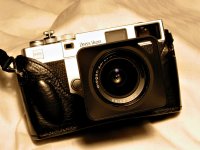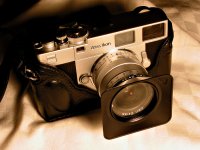kingsley
Jabberwocky
I just purchased the new Zeiss body and 50mm lens. I am looking for a second lens for outdoor shooting (mainly landscapes) and wanted to input from the forum. I need to budget my purchase of a second lens would be interested to hear the group's feedback on what they would acquire as their second lens for now as I build my 'kit'. Thanks
S
Socke
Guest
IMHO 28 and 50 is a better combination than 35 and 50. I use the 35 as an alternative to both to avoid changing lenses.
back alley
IMAGES
Socke said:IMHO 28 and 50 is a better combination than 35 and 50. I use the 35 as an alternative to both to avoid changing lenses.
me too.
i might look at the 25 also, more money but a fine lens and makes a nice combo with the 50.
S
Socke
Guest
Oh, and welcome to the forum!
Fred
Feline Great
You can always crop an image taken withe a 28 to give a 35 field of view, but not the other way around.
Oddly I do tend to use the 35 75 combination most of the time. I would consider some of the alternatives makes to fill the 'gap' following your decision to cover the non Zeisse lens.
Oddly I do tend to use the 35 75 combination most of the time. I would consider some of the alternatives makes to fill the 'gap' following your decision to cover the non Zeisse lens.
Flyfisher Tom
Well-known
A 28mm would work very well with your 50mm.
Some other possible non-Zeiss considerations ... the m-hexanon 28/2.8 (exceptional bokeh), CV 28/1.9 (very smooth signature). m-hexanon ($600-$900 depending on condition), cv ($444).
good luck
Some other possible non-Zeiss considerations ... the m-hexanon 28/2.8 (exceptional bokeh), CV 28/1.9 (very smooth signature). m-hexanon ($600-$900 depending on condition), cv ($444).
good luck
kingsley
Jabberwocky
Thanks for feedback & 2nd Question
Thanks for feedback & 2nd Question
Thanks for the great input!
I now seem to be 'leaning' in the direction of the 28mm versus the 35mm as my second lens to compliment the 50mm. Any other input is of course welcome.
2nd Question: Is there a good quality case for the Zeiss you can recommend and where to buy?
p.s. - RFF is a terrific website and really enjoying my time on it learning many new things. As a Supernumery to Rangefinder photography RFF is an excellent resource for me. Have a great 4th of July!
Thanks for feedback & 2nd Question
Thanks for the great input!
I now seem to be 'leaning' in the direction of the 28mm versus the 35mm as my second lens to compliment the 50mm. Any other input is of course welcome.
2nd Question: Is there a good quality case for the Zeiss you can recommend and where to buy?
p.s. - RFF is a terrific website and really enjoying my time on it learning many new things. As a Supernumery to Rangefinder photography RFF is an excellent resource for me. Have a great 4th of July!
back alley
IMAGES
K
Kyle
Guest
My brother has that CV case (the brown one) for his Bessa. I should steal it and put the ZI in there and see how it fits.
BTW, I highly recommend the ZM 25. Its a great lens, and 25/50 makes a very nice combo. You can use the entire viewfinder of your ZI to get the approximate view of a 25mm lens.
BTW, I highly recommend the ZM 25. Its a great lens, and 25/50 makes a very nice combo. You can use the entire viewfinder of your ZI to get the approximate view of a 25mm lens.
aoresteen
Well-known
If you get the 28mm, your nex wide angle is the 21mm as the 25 and 28 are too close.
If you get the 35mm your next wide angle is the 25mm.
The 28mm, 50mm and 90mm make a great kit!
If you get the 35mm your next wide angle is the 25mm.
The 28mm, 50mm and 90mm make a great kit!
kingsley
Jabberwocky
Thanks again for all the valuable input. I ordered the 28mm
SDK
Exposing since 1969.
aoresteen said:If you get the 28mm, your nex wide angle is the 21mm as the 25 and 28 are too close.
If you get the 35mm your next wide angle is the 25mm.
The 28mm, 50mm and 90mm make a great kit!
25mm and 28mm are not as close as all that! 21mm, 25mm, 28mm, 35mm, 50mm, 75mm and 90mm make a great kit too
Kingsley, you won't regret getting the 28mm Biogon, it's a great lens, especially for landscapes.
SDK
Exposing since 1969.
ferider said:SDK,
do you have some pictures you can share, maybe even in comparison to
28/1.9 and Summicron ? I have rarely seen the 28 in use and am very interested.
Thanks,
Roland.
Hi Roland,
Look at my recent posts in The Leica Forum thread on 28mms. Mostly Summicron 28mm images, but one Zeiss 28mm Biogon too. I just have not printed as many pictures from the Zeiss yet, scanned, cleaned up the dust spots and posted them to my website (http://www.people.fas.harvard.edu/~keirst/). Both are great lenses!
Last edited:
kingsley
Jabberwocky
Thanks for the additional feedback. Anxious to try the 28mm. On the case question I did break down and buy the Luigi case.
K
Kyle
Guest
kingsley said:Thanks for the additional feedback. Anxious to try the 28mm. On the case question I did break down and buy the Luigi case.
Is your ZI black? If so, I'd be interested in pics of the ZI with the Luigi case. Last time I checked, his site had no pictures of the black ZI with a case.
kingsley
Jabberwocky
The camera body is black.
Once I receive the new case this week I will take a picture and post it.
Once I receive the new case this week I will take a picture and post it.
kingsley
Jabberwocky
SDK,
Were most of the landscapes in your website shot with a 28mm lens?
Were most of the landscapes in your website shot with a 28mm lens?
SDK
Exposing since 1969.
kingsley said:SDK,
Were most of the landscapes in your website shot with a 28mm lens?
Hi Kingsley,
No, actually most of them are not. A few of the 35mm film images are, but most of them are 20mm, 24mm or 25mm lens images. I do love 28mm lenses and their equivalents in other formats, and I use them all the time. I just have not picked that many 28mm origin prints to scan for the website. A few are telephoto shots.
A lot of the landscapes from Maine are on 4X5" negatives, shot with either 90mm/6.8 Angulon (very similar view to the 28mm lens in 35mm), but mostly on 135mm/5.6 Sironar-N, a fine little lens that is close to the horizontal angle of view you get with 40mm lens in 35mm. I recently got a big 80mm/4.5 Super-Symmar Aspherical LF lens to replace the compact Angulon, which is unfortunately rather soft in the corners; 80mm is equivalent to a 24-25mm approximately. The Super-Symmar is much crisper, but does have a bit more obvious light fall off, so I'm afraid I'll have to spring for the center filter. Four originate with a 240mm/5.6 Symmar-S, a big beast that is about equivalent to 72mm telephoto in 35mm terms when used on my aunt's speed graphic 4x5", but doubles as a 35mm equivalent wide angle on my grandpa's 8X10."
Is there any image in particular that you want to know about?
Steve K.
kingsley
Jabberwocky
Hi,
Thanks for the detailed reply. What lens was employed for the picture entitled "Moonrise, Brooklin Maine"?
Again, as I am learning the ropes please excuse my novice level questions but have one additional one. In reading some of the posts on the RFF several posters make reference to the methods of development which some of the terms are bit 'foreign' to me. My early days of shooting have me taking the film to Ritz for prints and I typically have a CD made. Some of the posters refer to a 'scanned negative' which I can't translate into "novice RFF speak"! Can you enlighten me on this terrm or are they simply stating the images are scanned to a CD.
Secondly, years ago as a teenageer with an old Zeiss RFKodacrome 25 speed color slides. Again a novice question, but assume when shooting color slide film most development companies (like a Ritz) can produce a CD with the scanned images(?).
Thanks for the detailed reply. What lens was employed for the picture entitled "Moonrise, Brooklin Maine"?
Again, as I am learning the ropes please excuse my novice level questions but have one additional one. In reading some of the posts on the RFF several posters make reference to the methods of development which some of the terms are bit 'foreign' to me. My early days of shooting have me taking the film to Ritz for prints and I typically have a CD made. Some of the posters refer to a 'scanned negative' which I can't translate into "novice RFF speak"! Can you enlighten me on this terrm or are they simply stating the images are scanned to a CD.
Secondly, years ago as a teenageer with an old Zeiss RFKodacrome 25 speed color slides. Again a novice question, but assume when shooting color slide film most development companies (like a Ritz) can produce a CD with the scanned images(?).
S
Socke
Guest
kingsley said:Hi,My early days of shooting have me taking the film to Ritz for prints and I typically have a CD made. Some of the posters refer to a 'scanned negative' which I can't translate into "novice RFF speak"! Can you enlighten me on this terrm or are they simply stating the images are scanned to a CD.
Exactly, in my case not to a CD but a harddisk and then to DVDs. A typical lab scan is a 1300x1800 pixel jpeg around one Megabyte, my scans are 2400x3600 pixel tiff at 30 to 50 MBytes. This way I get files I can work with, like colour adjustments, crops etc.pp.
kingsley said:Secondly, years ago as a teenageer with an old Zeiss RFKodacrome 25 speed color slides. Again a novice question, but assume when shooting color slide film most development companies (like a Ritz) can produce a CD with the scanned images(?).
Scanning slides is more expensive than print film. Here they only scan slides which have been framed and then they charge 20 Euro per 100 slides, when I started scanning slides it was 0.90 Euro per slide again fore a small jpeg. So i bought the filmscanner and do it myself.
Share:
-
This site uses cookies to help personalise content, tailor your experience and to keep you logged in if you register.
By continuing to use this site, you are consenting to our use of cookies.


